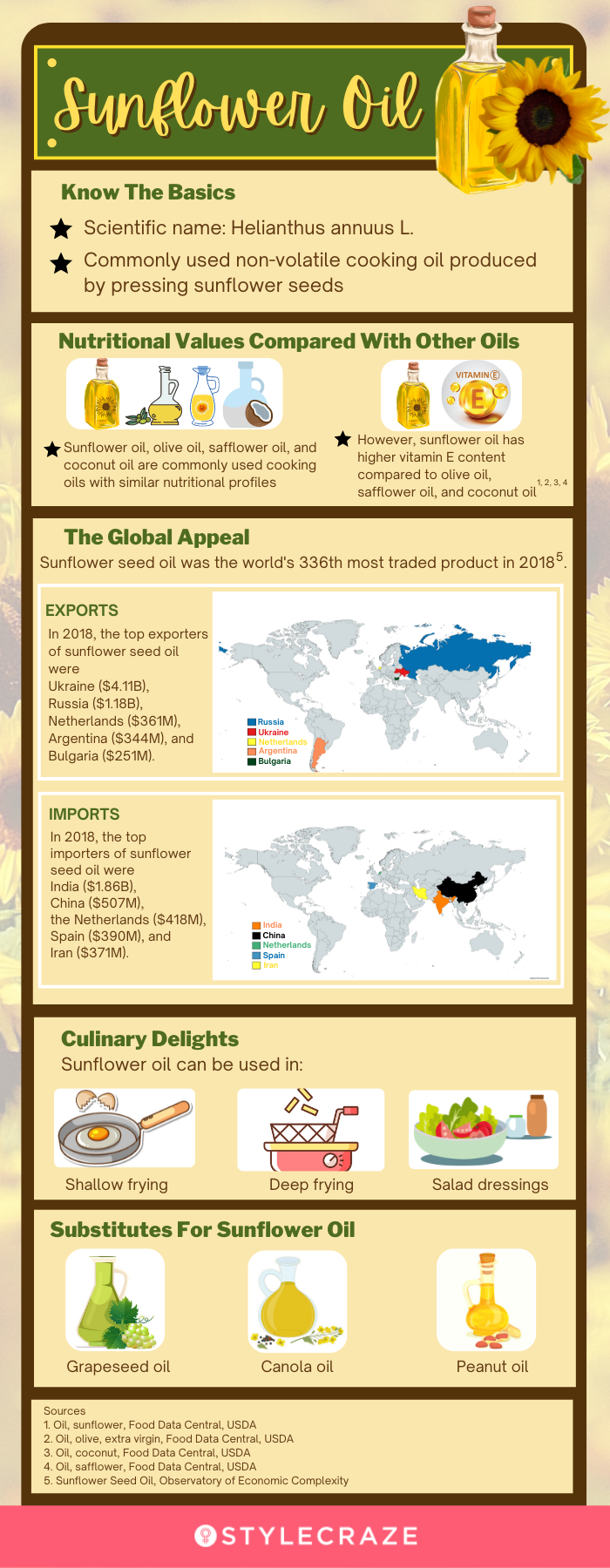How Is Sunflower Oil Good For Your Health?
The most abundant nutrient in the oil is vitamin E. It also contains linoleic acid, an essential fatty acid, and oleic acid. While linoleic acid is a polyunsaturated fat, oleic acid is a monounsaturated fat. What Are Its Benefits? It promotes digestion, heart health, skin health, and oral health, reduces inflammation, and may help fight cancer. Who Can Consume It? It can be safely consumed by all but is specifically beneficial for people with high blood pressure. How Often? You can consume 1.5-2 tablespoons of sunflower oil daily. Caution Avoid consuming sunflower oil if you have diabetes or experience any allergic reaction.
A monkey study shows that these two components can enhance fatty acid profiles in the body (2). The linoleic acid in the oil also supports the immune system and its normal response. Substituting animal fats with sunflower oil also cuts down the risk of cardiovascular disease (3). The oil is available in different varieties – linoleic, mid-oleic, and high-oleic. Each varies in the amount of unsaturated and saturated fats, but their nutritional benefits are the same. One of the nutritionally rich natural foods – sunflower oil benefits your general health while lifting your mood, improving cognitive function, and a lot more.
What Are The Health Benefits Of Sunflower Oil?
The unsaturated fatty acids in the oil promote heart health. Sunflower oil also contains vitamin E, which has excellent benefits for the skin. The varied nutrients in the oil offer great health benefits.
1. Promotes Heart Health
The American Heart Association lists sunflower oil among those with less saturated fat and more of the better fats (4). You can replace solid fats in your diet (including butter and margarine) with sunflower oil. This can help prevent heart disease. Sunflower oil also may have beneficial effects on the cholesterol profile. The unsaturated fats it contains are well metabolized in the liver. This contributes to improved cholesterol profiles (5). Sunflower oil also lowers cholesterol levels. It also increases the levels of HDL (good cholesterol), thereby reducing the risk of cardiovascular disease (6).
2. May Promote Digestion
Some sources state that sunflower oil might have laxative properties – and this may ease digestion and metabolism which may be linked to easier weight loss. We need more research in this regard, though.
3. May Enhance Oral Health
Sunflower oil is extremely beneficial for oil pulling. It reduces plaque-related gingivitisi A mild form of oral disease that affects the gingiva (present in the gum) and causes inflammation, redness, and irritation. (7). The oil exhibits antibacterial activity against C. albicans, which is the most common cause of infections in people (8).
4. May Help Fight Cancer
In a mouse skin tumor model, the sunflower oil had offered 40% efficacy in cancer prevention. This was attributed to the sesamol in the oil (9). However, we need more research to further establish sunflower oil’s chemopreventive properties.
5. May Fight Inflammation
Sunflower oil may prevent the gastric damage most NSAIDs (nonsteroidal anti-inflammatory drugs) cause. When taken with indomethacin (an NSAID), the oil was found to reduce the adverse side effects of the drug (10). We don’t know yet how effectively sunflower oil reduces inflammation as research is ongoing. Anecdotal evidence suggests that it might help treat rheumatoid arthritisi An autoimmune disease that affects small joints like the wrist, leading to joint pain and inflammation. by reducing inflammation. However, we need conclusive research in this aspect. Also, sunflower oil is rich in omega-6 fatty acids. Excess intake of these can trigger the production of pro-inflammatory chemicals in the body (11). The standard American diet is already high in omega-6 fatty acids. Hence, you should be careful before adding sunflower oil to your diet – especially in this regard.
6. Fights Acne
Topical application of sunflower oil, rich in antioxidants, helps boost skin health. The oil is rich in vitamin E, a potent antioxidant. It may potentially fight the actions of the reactive oxygen species, which may have a role to play in acne (12). Sunflower oil can also accelerate the recovery of the skin barrier. This can be attributed to the linoleic acid in the oil (13).
7. Helps Treat Eczema
When topically used, sunflower oil can have excellent anti-inflammatory effects (14). As discussed, the oil also improves the skin barrier. This way, it further enhances skin health. The vitamin E in sunflower oil aids the treatment of atopic dermatitis (eczema). Oral vitamin E treatment in 96 eczema patients resulted in improvement and near remission of the condition (15). The oil also may treat dry skin, which is another symptom of eczema. As we saw, the vitamin E in the oil largely contributes to the oil’s skin benefits. The same vitamin E can also yield great benefits if you use sunflower oil for hair. The unsaturated fatty acids in the oil promote better health. Manila, a blogger, highlights the diverse benefits of sunflower oil, emphasizing its richness in vitamin E and omega 3, and shares observations after using it for pimple marks. She states, “After using it for a month, I observed some great changes, and it’s lighter compared to before. I’m happy with the results, and I added this miracle oil to my daily beauty routine (i).” The following section gets into the details of these constituents of sunflower oil.
What Is The Nutrition Profile Of Sunflower Oil?
*Values sourced from nutritiondata.self, oil, vegetable, sunflower The nutritious oil could be replete with healthy unsaturated fatty acids and using it in cooking is a sure-shot way to boost your health and energy. But before you do that, you may want to know its potential ill effects.
What Are The Side Effects Of Sunflower Oil?
Possible Issues During Pregnancy And Breastfeeding
Sunflower oil is beneficial during pregnancy and breastfeeding – it conserves vitamin A in breast milk that can be beneficial to the baby (16 ). But you need to reduce its intake – as the oil is high in omega-6 fatty acids that may not be healthy in large amounts (17).
May Aggravate Diabetes Symptoms
Sunflower oil may increase fasting insulini A peptide hormone produced by the pancreas that regulates the amount of glucose in the blood and controls blood sugar levels. and blood glucose levels due to its linoleic acid content (18). It may also increase post-meal blood fats. If you have diabetes, stay away from sunflower oil.
May Cause Allergies
If you are allergic to plants like ragweed, marigolds, daisies, and chrysanthemums – you may experience allergies with sunflower oil. Sunflower oil is often confused with safflower oil. The two have unique qualities and are suitable for various culinary uses. Learn more in the section below.
Sunflower Oil Vs. Safflower Oil
What is the substitute for sunflower oil? Discover in the infographic below more about sunflower oil, its nutritional values compared to other popular oils, how you can add it to your diet, and some alternatives. Illustration: StyleCraze Design Team You can substitute sunflower oil with safflower oil and olive oil. Is sunflower oil gluten-free? Yes. Most cooking oils are naturally gluten-free. Sunflower oil is also gluten-free. Can sunflower oil whiten skin? Yes. While the linoleic acid in sunflower oil helps control melanin production and reduces pigmentation, its vitamin E may brighten skin tone (19), (20). Can I leave sunflower oil on my body overnight? Yes, you may. The oil is non-comedogenic, absorbs well, and does not clog pores or cause any irritation. Can sunflower oil remove dark circles? Yes, the vitamin E in the oil can help reduce dark circles and under-eye bags (15). Does sunflower oil contain vitamin D? No, sunflower oil does not contain vitamin D (21).
Illustration: Amazing Benefits Of Sunflower Oil Nutrition & Side Effects
Uncover the top 7 health benefits of sunflower oil. From promoting heart health to enhancing skin radiance, check out this video to learn how this versatile oil can positively impact your well-being.












